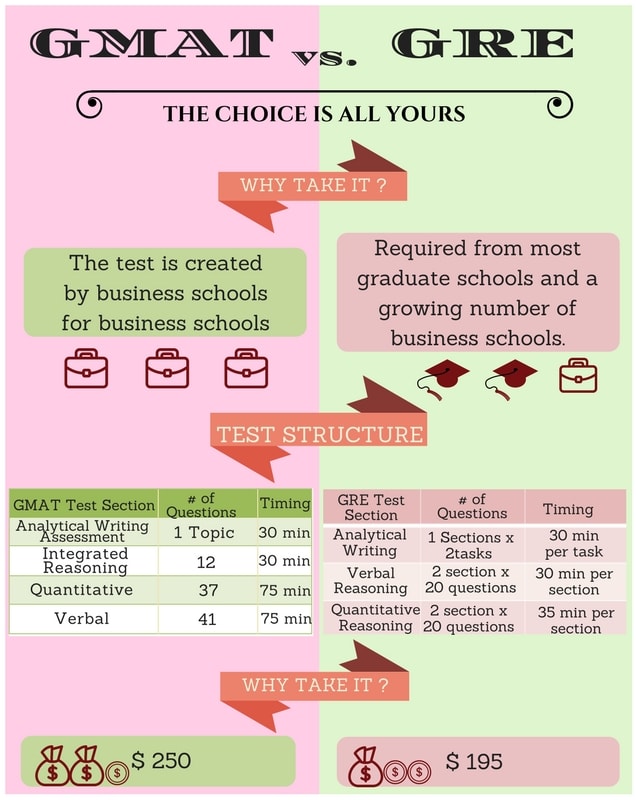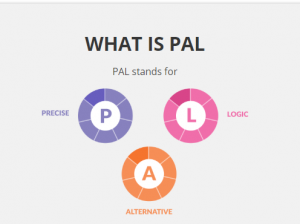Should you take the GRE or the GMAT? Do you know the difference between the two? Learn all about it here.
It used to be that is you wanted an MBA, you had one test option. You’d need to submit your GMAT scores to the school of your choice. Now you have more options! In recent years the business schools all over the country will accept the GRE as a valid replacement for the GMAT.
But how do they really differ, and is one more highly favored by business schools over the other? Which one should you take?
This comprehensive guide will provide you all the answers you may need to decide which test is the right one for you. We’ll also provide a thorough series of tables here to know what test best fits your career path.
What we will cover?
GRE vs GMAT: Which Test Is Right For You?
Many of the graduate school programs today will accept GMAT, but the majority of them now require the GRE as part of the admissions process.
To know which test is right for you, research the business school you want to attend to confirm if it accepts GMAT or GRE or both.
Which Test is Easier: GRE or GMAT?
This is a case of apples and oranges, where you really can’t gauge which one is easier since they have different criteria.
For GMAT, you are tested based on your quantitative and analytical skills and your ability to interpret data that is presented to you in tables, charts, and graphs.
The GRE math section will allow you to use a calculator for quantitative problems, which is not usually the case with GMAT. Those who are used to taking tests may find it easier to solve the questions in GRE, especially if they have strong vocabularies.
Either way, both types of tests will have some “idiosyncratic” question types that you need to prepare for, especially the ones involving data analytics. You can prepare for them by taking practice tests or mock exams.
Keep in mind that one big difference is that on the GRE, you have the option to go back and change your answers or skip questions and return to them in you have time. This can reduce text anxiety for some people (even if they don’t end of taking advantage of this during the real test).
The Difference Between the GRE and GMAT
The GRE and GMAT mainly differ in the way the tests are structured and scored. They also differ in the way their verbal sections are designed, and the difficulty of their questions pertaining to quantitative questioning and analytical writing.
Structure and Scoring
This chart will highlight their main differences in structure and scoring.
| GRE | GMAT | |
| No. of Multiple-choice Questions | 80+20 research questions that are all unscored | 90 |
| No. of Sections | 6, which includes unscored research area | 4 |
| Composite Scoring | There’s verbal and quantitative reasoning whose score ranges are at 130-170, in one-point increments. A total of: 260-340 | A range of 200-800 in ten-point brackets, under a Composite GMAT score |
| Scores Validity | 5 Years | 5 years |
| Total Cost | $205.00 | $250.00 |
| No. of Essays | 2 | 1 |
| Length | 3 hours and 45 minutes | 3 hours and 30 minutes |
Verbal Sections
For the main difference, GMAT’s verbal questioning is more grammar-related, while the GRE will test you more for vocabulary. GMAT verbal questions will assess how deep your understanding is for written material and how you can evaluate arguments on a variety of topics. You will be asked for your verbal skills in the area of reading comprehension, critical reading, and sentence correction.
Meanwhile, GRE Verbal section tests you for how you analyze and draw conclusions from excerpts of data. You need to be strong in identifying the core of the arguments and summarizing passages to get into what a certain word, idea, or sentence means.
Quantitative Questioning
You have two sections to answer in GMAT quantitative questioning: the quantitative section and the integrated reasoning area. In these areas, you will be tested for data sufficiency and problem-solving skills.
Problems relating to these areas will involve graphs, equations, and other types of numerical data. For GRE quant, you will be tested for arithmetic, algebra, data analysis, and geometry. Fortunately, most of these questions will be multiple choice.
GRE math will test you for your intuitive number sense and number manipulation, while the math of GMAT may be more elaborate and complex.
For example, there are questions in GMAT where you will be asked whether you have enough information to be able to answer the question, but don’t have to actually answer the question itself. That said, assess yourself if your quantitative background is strong enough through mock or diagnostic tests, especially if you have a weaker math background.
Here are the other differences between the two in this area:
| GRE | GMAT | |
| No. of Quant Sections | 2 | 2 |
| No. of Quant Questions | 40: 20 questions for each section | 49: 37 for quant section, 12 for the integrated reasoning |
| Average Length | 60 minutes total, 30 minutes for each half | 105 minutes total |
| Topics Tested | Arithmetic, Data Analysis, Algebra, Geometry | For Quant: – Data Sufficiency – Problem-solving. Integrated Reasoning: – Graphics interpretation – Two-part analysis- Table analysis- Multi-source problem solving |
| Range of Score | 130-170 | For Quant: 0-60
Integrated Reasoning: 1-8 |
Analytical Writing
The difference in analytical writing is that with the GMAT, you’re only required one essay, but GRE asks you for two.
The GMAT will give you an essay prompt that will take you about 30 minutes to finish. There’s an argument presented to you before you evaluate it for its weaknesses and good points in the form of an essay.
You’re not really giving an opinion about the argument. You just have to assess the argument for its shortcomings and the ways the argument can find improvement.
GRE’s requirement of two essays will ask you to analyze an argument and critique it for its weak spots. 30 minutes is also given for you to answer.
Costs
The GRE will cost you about $205, while GMAT is $250. The difference in the cost would be negligible, but that would be an issue if you keep on retaking the exams.
Before taking one type of exam, make sure if it’s the right one you need for your business career to avoid unnecessary test fees.

Steps to Help You Choose
To know if GRE or GMAT is the right one for you, these steps may help you:
1. Policies of Business Schools
Learn the policies of your top choice business school(s) and the scores required. There are different requirements among business schools, so it pays to go to their official website and see their preference. Make sure you take notes of the differences of each business school’s requirements and average scores of the students they admit, so you have accurate metrics to set your goal.
2. Mock Diagnostic Tests
Take a mock test for both GMAT and GRE and see if one gives you an advantage. There are free GMAT and GRE diagnostic tests online that can help you assess your strengths and weaknesses. When you see the results of the tests, you’ll hopefully have a better idea which will be the best fit for you.
3. Have a Ballpark Idea of the Market Value
Assess the value you will get in the job market when you finish the GRE or GMAT. Check if it’s GMAT or GRE that may offer you the best job opportunities after graduating. Your situation may differ depending on what state you live in, and so check for local opportunities first or at least where you are planning to use your GMAT or GRE exam results.
4. Assessing Your Math Skills
Assess your math skills. Experts say that GMAT will have more difficult math questions than GRE, so make sure you take the proper measures to prepare for the exam.
5. Assess Your Language Skills
Check your aptitude in language skills. Experts will agree that the GRE will test you for more obscure words than GMAT, especially in the verbal section. See which area you are strongest in after getting your results from a practice test.
GMAT vs GRE Scores

The average score across the United States for GMAT using the standards of the top 50 business schools is 703. But the GMAT score you should aim for will still depend on the policy of the individual school admissions standards.
As an outline for GMAT, consider the following criteria: the average score of the last incoming class, the last year’s class profile, the GMAT score required for a scholarship and the estimated ROI that you’d have to hit for a certain GMAT score.
For GRE scores, you need to account for many of the same things. You can use the same criteria to figure out the right average. But, to put you in the average top 10% of all test takers, it’s best to score 163-170 for verbal, 165-170 for quantitative, and 5.0-6.0 for writing.
FAQs
What is GMAT?
The GMAT (Graduate Management Admissions Test) is a standardized test that you have to submit before you can enter into an MBA course of your choice. In a 10-point increment, you will be tested in four sections. You can score between 200 and 800 across these sections.
You may be able to take the GMAT all year round and you’re allowed to take it a maximum of 5 times in a year, and 8 times in a lifetime.
What is GRE?
The GRE (Graduate Records Examination) is the standardized exam you have to pass for a plethora of graduate programs. The GRE has 3 sections and you have to score anywhere between 130 and 170 in just 1-point increments.
How do I score higher on my GMAT or GRE?
There are plenty of ways you can prepare for either test. For one, you can take a diagnostic test online that will give you a practice mock exam that you can use to check where your shortcomings are.
Secondly, you can join forums and community boards to ask around for tips and suggestions to get a better score. A study group may also be beneficial.
You may also buy software from reputable websites that can provide prep questions for both GMAT and GRE.
Hiring a tutor or taking module programs will help give you more practice in the subjects covered on both exams. Some of these programs may even be available for free.
Conclusion
As a conclusion, we should say here that the big difference between GRE and GMAT is type of questions being asked in the exam. Though there are many things to consider, the most important is if the business school you want to attend will accept either test format or only one. The business schools you’re planning to enter will decide which of the two types you should be investing in.
Most business schools already accept GMAT, but many prestigious, IVY league graduate programs now require you to take a GRE. Either way, always go out of the way and visit the website of each business school you are applying for to know their preference and requirements.
According to Poets and Quants, most of the business schools today don’t really care if you took the GMAT or GRE, but it’s best to be prepared and check for yourself if your target school has a preference.
Next, you should decide based on your strengths and weaknesses. It’s best to take full-length, timed, and accurate mock test fo both exams to see where you fare better. After the results of the exam, be honest with yourself, and assess which areas you are strongest in. You can also take the test several times to make sure that your score is accurate.
Lastly, check for the ROI. See if the career path you plan on taking will have a return of investment from having a GRE or a GMAT assessment.
So there you have it. We have covered all the essentials. So what is your final answer: are you going for GRE or GMAT?


![Best GMAT Prep Courses [2024] - Which One Should You Pick? Best GMAT Prep Courses [2024] - Which One Should You Pick?](https://digitalvaults.org/wp-content/uploads/2020/05/D222-300x70.png)

Review Summary
User Reviews
There are no reviews yet. Be the first one to write one.
Share Your Experience